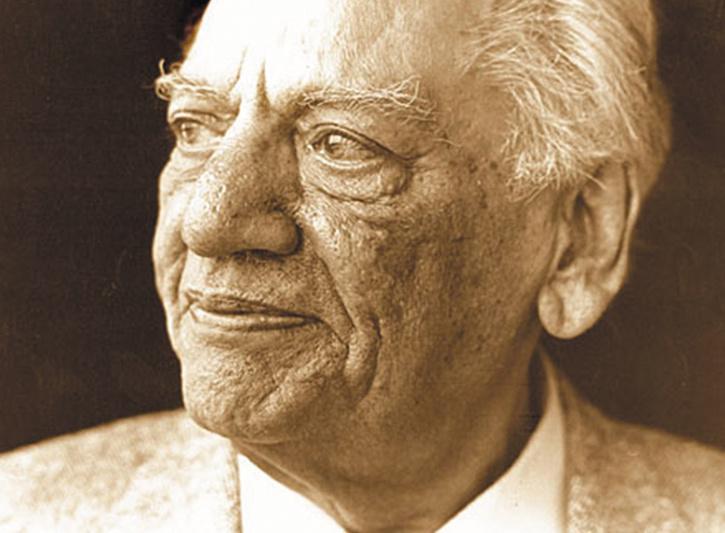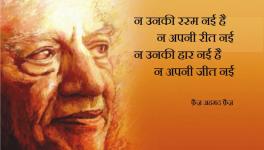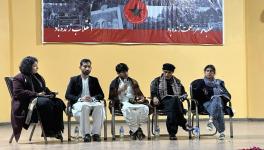How to Read Faiz for Those Who Never Read Poetry

The British literary theorist Terry Eagleton narrates in his book, How to Read a Poem, an amusing—perhaps apocryphal—anecdote about the Victorian poet, Robert Browning. When asked what one of his poems meant, Browning apparently replied that at the time of writing it, God and Robert Browning knew its meaning; now, God knows.
A poem by its very nature is a kind of overcode; a discourse that exploits both emotive and metaphorical dimensions of language. That is why a poem cannot be reduced to a simple factual statement. This is not to imply that decoding a poem can be a free-for-all. A poem has to be interpreted in light of the relationships of its words, sounds, intonations, cadences, and contexts. Each of these aspects are important, individually and collectively, because words can change their meanings, and even their context can be lost sight of.
A poem is not necessarily addressed to, or written for, a specific audience. Hence, poetry passes the test of time: it retains its relevance even in a different context. After all, who has not heard those all-purpose Urdu couplets being used in a variety of contexts?
This is what has happened to the progressive Urdu poet Faiz Ahmad Faiz of late. The widespread protests against the controversial Citizenship Amendment Act, 2019, which began on 12 December 2019, have given his famous nazm, Hum Dekhengey [We Shall See] an entirely new context.
Hum Dekhengey was written 40 years ago by an avowedly atheist poet in protest against the fundamentalist military dictator ruling over Pakistan at the time, Zia-ul-Haq. It has sparked a controversy in India now, because the premier technology institute, IIT Kanpur, has set up a committee to decide whether the poem is “anti-Hindu”.
IIT students recited the poem on 17 December while protesting against the police crackdown on Jamia Millia Islamia (Jamia) students. The police, especially in Bharatiya Janata Party-ruled states, have reportedly used excessive force against protesters, especially students of Jamia and Aligarh Muslim University. Besides thrashing students and arresting human rights activists who are leading the movement against the divisive new citizenship law, over two dozen ordinary protesters have been killed and several hundreds arrested in the ongoing crackdown.
In Uttar Pradesh, after Chief Minister Yogi Adityanath’s warning that he would take “revenge” on alleged vandalism during the protests, the state is seizing and auctioning properties to compensate for its own and private parties’ losses. The police have swung into action, sending notices and sealing shops, all without following due procedure.
In this context, it is interesting to note how beautifully the protest poetry genre has been exploited by the students who are opposing the amended citizenship law. Not just Hum Dekhengey, even Pakistani revolutionary poet Habib Jalib’s Main Nahin Manta [I disagree] has suddenly become hugely popular, thanks to them. But when IIT Kanpur students chanted Hum Dekhengey, one faculty member and 15 students filed a complaint, demanding expulsion of the protest’s organisers, accusing them of “spreading hate against India”.
The complainants do not seem to fully comprehend the meanings, context and significance of Faiz’s nazm. This is a poem with an extraordinary rhythm. Its cadences enhance the meaning of the words in the poem. It has been composed in a way that makes it especially suitable to sing or speak out loud in large public gatherings. It also deploys some important metaphors. An untrained ear may end up reducing these analogies down to their literal meaning. For example, the word “but”, which means idol, and the word “Allah”, in the context of the poem, are not to be interpreted literally. Though derived from Islamic history, these words have not been used in theological terms by Faiz. To interpret them in doctrinal religious terms would do injustice to Faiz’s revolutionary intentions.
For those unfamiliar with the genre, no poem is to be interpreted without paying close attention to its inter-relationship of words, images and sounds. Faiz alludes to that time in history when with the arrival of Islam idols were broken in Kabah. However, the idols in his poem suggest authoritarian rule. His poem says that such an autocratic power is to be replaced by the power of the ordinary people.
The words “but” and “Allah” in the poem should also not be read in isolation. They are to be viewed in relation to other words in the poem, such as “mehkoomon” or those who are ruled over, and “mardud-e-haram”, which means people who are barred from sacred places. Similarly, the poem has the words “ana al haq” or I am the truth and “ḳhulq-e-ḳhudā”, or ordinary people. Only when these words and phrases are taken into account does Faiz’s real voice of resistance against tyranny fall in place.
Literature derives imageries and symbolisms from the cultural context it originates from. English poetry, for instance, often uses Biblical metaphors without necessarily becoming religious in spirit. In the same way, Hindi poems can announce secular ideas through the use of imagery drawn from ancient Sanskritic traditions. India’s cultural diversity allows poets in Hindi, Urdu and other languages to draw ideas from a variety of traditions—Hindu, Islamic and others. Though they may write about [the Hindu gods] Rama and Krishna, Tulsidas and Surdas are poets, not religious preachers. The spirit of Urdu poetry has essentially been secular; take for example the irony and mirth that is generally directed at the figure of the religious preacher in Urdu poetry.
The word “but” in Faiz’s poem suggests “false gods” who will be unable to hold themselves aloft against the power of the truth. This is implied by the concept of “ana al-haq”. It is a very narrow interpretation of the nazm if false gods in the poem are read as a reference to Hindu gods, who are no less respected by most Muslims.
In Faiz’s nazm, the power of truth rests within ordinary people, the mahkoom or those who are ruled upon. It is they, the poet says, who will rule the world once the forces of tyranny, though they may appear like tall mountains, are blown away. When the people rule, all crowns and thrones, the symbols of authoritarian power, will be destroyed by the power of truth. This is the meaning suggested in Faiz’s “Allah” and “ana al haq”.
Further, the nazm’s Allah is not to be confused with god or subjected to an Islamic interpretation. It is to be heard in terms of the power of truth. In its spirit of resistance, Hum Dekhengey seems closer to the first lines of Carl Sandburg’s famous poem, ‘I am the people, the mob, the crowd, the mass’. His poem anticipates a time when the crowd or the mob—the people—will rule the world. So “mob” in the context of his poem is simply a reference to ordinary people.
The dystopian web series based on the novel Leila by Prayaag Akbar, narrates the sinister hold of a highly bigoted, casteist and patriarchal right-wing force over a country in the 2040s. The country in the web series has been suggestively named Aryavarta. Ironically, Aryavarta’s number two man, the fictional Mr Rao played by Akash Khurana, is enamoured of Faiz’s poetry. In the setting of this series, the world is a place where Muslims, Dalits and women have been relegated to the margins. Literature and the social sciences have no place in this world. But even in this post-apocalypse world, Faiz has survived. Haven’t you heard—truth is stranger than fiction…
Mohammad Asim Siddiqui teaches English and Aftab Alam teaches political science at AMU, Aligarh. The views are personal.
Get the latest reports & analysis with people's perspective on Protests, movements & deep analytical videos, discussions of the current affairs in your Telegram app. Subscribe to NewsClick's Telegram channel & get Real-Time updates on stories, as they get published on our website.
























